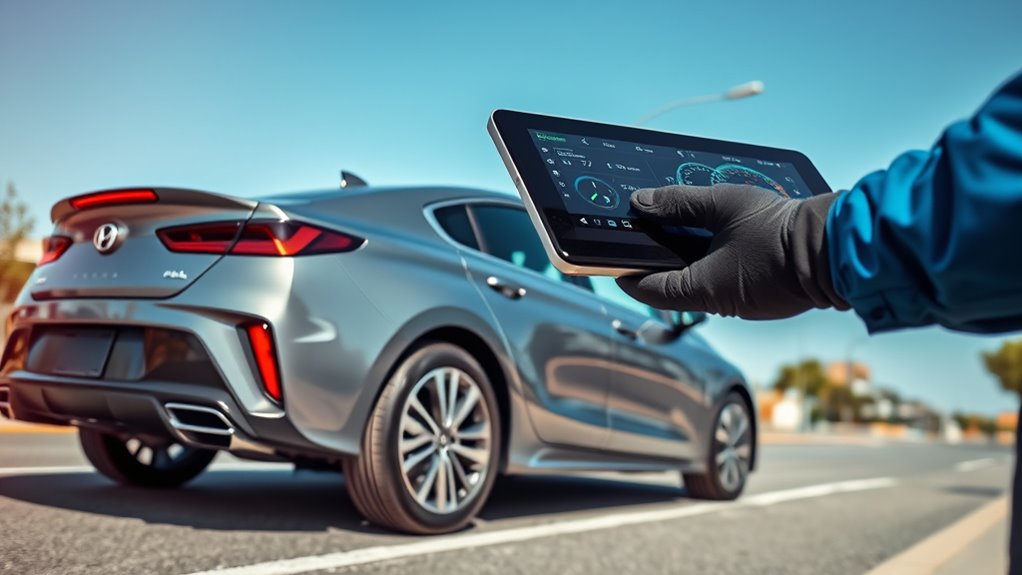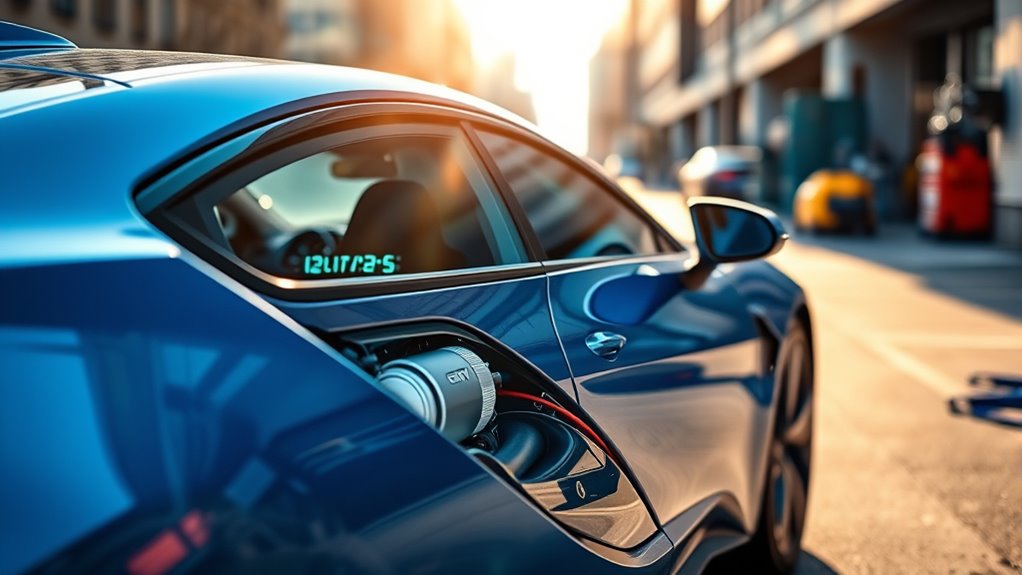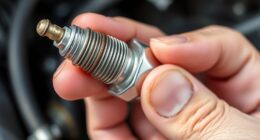Hybrid maintenance costs differ from traditional cars because they have specialized parts like batteries and electric motors that may need unique repairs. Battery replacements are infrequent but expensive, costing $2,000 to $8,000, though warranties often cover some of this. You’ll save on brake repairs thanks to regenerative braking and enjoy lower fuel costs. However, complex hybrid systems can lead to higher repair expenses if issues occur. Want to discover more about managing these costs effectively?
Key Takeaways
- Hybrid batteries typically last 8-15 years with replacement costs ranging from $2,000 to $8,000, but are infrequent due to warranties.
- Regenerative braking reduces wear on brake pads and rotors, lowering brake maintenance costs compared to traditional vehicles.
- Complex hybrid systems, such as electric motors, may require specialized repairs, increasing potential maintenance expenses.
- Fuel savings from better fuel efficiency help offset higher repair costs in the long run.
- Overall maintenance costs are influenced by warranty coverage, battery life, and the need for specialized parts and inspections.

Have you ever wondered how maintenance costs for hybrid vehicles compare to traditional gas-powered cars? The answer isn’t just about fuel savings; it’s also about what you might spend on repairs and replacements over time. Hybrids are designed to combine a gasoline engine with an electric motor, which means their maintenance needs differ in some key areas. One of the main concerns is the battery. While hybrid batteries are built to last, they do eventually need replacement, typically after 8 to 15 years or more, depending on usage and climate. Replacing the battery can be costly, often ranging from $2,000 to $8,000, but this expense is usually infrequent and can be offset by lower fuel costs. The good news is, many manufacturers offer warranties covering hybrid batteries for up to 8 years or more, providing peace of mind and reducing out-of-pocket expenses during that period.
Another factor influencing hybrid maintenance costs is regenerative braking. Unlike traditional brakes that rely solely on friction, regenerative braking captures kinetic energy during deceleration and converts it into electrical energy to recharge the battery. This process puts less wear on the brake pads and rotors, meaning you’ll likely replace these components less often than you would in a conventional vehicle. As a result, brake system maintenance tends to be less frequent and less expensive for hybrids. However, it’s still essential to have your brakes inspected regularly because other parts, like the brake fluid and sensors, may need attention over time. Additionally, hybrid systems often include complex components like the electric motor, which may require specialized repairs if issues develop, potentially increasing maintenance costs. It’s also worth noting that some hybrid models have more complex systems, which might mean higher costs for certain repairs. Still, these costs are often balanced out by savings on fuel and less frequent brake repairs.
Frequently Asked Questions
How Do Hybrid Maintenance Costs Compare Over the Vehicle’s Lifespan?
You’ll find that hybrid maintenance costs are generally lower over the vehicle’s lifespan due to better fuel efficiency and longer battery longevity. Although initial repairs for the battery can be costly, these expenses tend to be offset by savings on fuel and reduced engine wear. Overall, hybrids require less frequent maintenance, making them more economical long-term, especially if you prioritize fuel efficiency and reliable battery performance.
Are Hybrid Vehicles More Expensive to Repair Than Traditional Cars?
Yes, hybrid vehicles can be more expensive to repair than traditional cars, mainly due to battery replacement costs and brake wear. You might face higher costs if the hybrid’s battery needs replacing, which can be pricey. However, hybrids often experience less brake wear because of regenerative braking systems, potentially saving you money over time. Overall, while initial repairs may be higher, some maintenance costs are lower than conventional vehicles.
What Specific Components Contribute to Hybrid Maintenance Costs?
Think of your hybrid’s components as a team of explorers. The battery, battling degradation over time, needs attention, while software updates act as guides, keeping systems running smoothly. These elements, along with specialized parts like inverters and cooling systems, add to maintenance costs. You’ll find that maintaining the battery’s health and updating software regularly are key to keeping your hybrid running efficiently and avoiding costly repairs.
How Do Hybrid Maintenance Costs Vary by Brand or Model?
You’ll find that hybrid maintenance costs vary by brand and model, especially regarding battery replacement and warranty coverage. Some brands offer longer warranties that reduce your out-of-pocket expenses for battery issues, while others may have higher replacement costs. It’s essential to check each vehicle’s warranty details and maintenance history, as these factors influence overall costs. Knowing these differences helps you plan better and avoid unexpected expenses down the road.
Are There Any Long-Term Savings With Hybrid Maintenance?
Are you wondering if hybrid maintenance offers long-term savings? You might be surprised because, with better battery longevity and regular software updates, hybrids can save you money over time. These updates help optimize performance and extend your battery’s life, reducing costly repairs. So, isn’t it worth considering a hybrid for the potential savings, especially as technology continues to improve and maintenance becomes more efficient?
Conclusion
Understanding hybrid maintenance costs isn’t just about numbers; it’s about seeing the future clearly. As you navigate these expenses, remember that they’re not just costs but investments in reliability and efficiency. Don’t let confusion cloud your judgment—think of these costs as the fuel that keeps your hybrid running smoothly. Embrace the change, for in adapting now, you secure a smarter, more sustainable tomorrow. After all, isn’t the future worth every penny?









